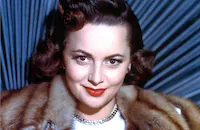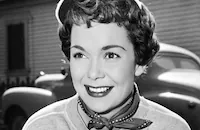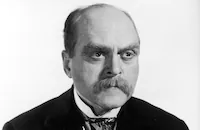My Love Came Back

Brief Synopsis
Cast & Crew
Kurt Bernhardt
Olivia De Havilland
Jeffrey Lynn
Eddie Albert
Jane Wyman
Charles Winninger
Film Details
Technical Specs

Synopsis
Amelia Cornell, a talented scholarship student at the Brissac Academy of Music in New York, finds that she is unable to continue her studies without outside assistance. At the same time, Dr. Kobbe, the dean of the school, prohibits Amelia from giving music lessons in her spare time, which she does in order to earn money to support her mother. Amelia finds herself on the verge of having to abandon her promising career as a swing bandplayer when she receives an unexpected scholarship, which allows her to continue her studies. After Amelia meets her patron, the kind and elderly Julius Malette, who manufactures musical equipment, he sends her a phonograph player and records to broaden her musical experience. He later invites her to several musical events. One evening, Julius is unable to keep a date with Amelia and sends his factory manager, Tony Baldwin, in his stead. Tony and Amelia soon fall in love, but Tony, who thinks that Amelia is his boss's sweetheart, does not reveal his feelings toward her. Although Tony later discovers Julius' true relation to Amelia, complications arise when Julius' son Paul learns that Tony has been mailing company checks to Amelia, unaware that they were mailed at the request of his father. Paul accuses Tony of misappropriating company funds, but soon apologizes for the accusation when he overhears his father telling Amelia how much he has missed being with her. After arriving at the conclusion that his father is being unfaithful to his mother, Paul apologizes to Tony and thanks him for trying to shield his family from the news. Later, at a party at the Malettes, where Amelia's roommate, Joy O'Keefe, and her boyfriend, Dusty Rhodes, give a musical recital, Julius' wife settles the misunderstanding and life resumes to normal.

Director

Kurt Bernhardt
Cast

Olivia De Havilland

Jeffrey Lynn

Eddie Albert

Jane Wyman

Charles Winninger

Spring Byington

Grant Mitchell
William Orr

Ann Gillis

S. Z. Sakall
Charles Trowbridge
Mabel Taliaferro

William Davidson
Nanette Vallon
Sidney Bracy
Tommy Baker
William Roberts
Wedgewood Nowell

Jack Mower
Richard Kipling
Creighton Hale
George Haywood
John Dilson
Richard Clayton
Crew
Earl Baldwin
E. A. Brown
Robert Buckner
Frédéric Chopin
Hugh Cummings
Rudi Fehr
Leo F. Forbstein
Ivan Goff
Ray Heindorf
Michael Hogan
James Wong Howe
Rowland Leigh
Franz Liszt
Arthur Lueker
Felix Mendelssohn
Orry-kelly
Max Parker
Wolfgang Reinhardt
Walter Reisch
Heinz Roemheld
Charles Rosher
Robert Ross
Cameron Shipp
Jack L. Warner
Perc Westmore

Film Details
Technical Specs

Articles
My Love Came Back
By Violet LeVoit

My Love Came Back
Eddie Albert (1906-2005)
The son of a real estate agent, Albert was born Edward Albert Heimberger in Rock Island, Ill., on April 22, 1906. His family relocated to Minneapolis when he was still an infant. Long entralled by theatre, he studied drama at the University of Minnesota. After years of developing his acting chops in touring companies, summer stock and a stint with a Mexican circus, he signed a contract with Warner Bros. and made his film debut in Brother Rat (1938). Although hardly a stellar early film career, he made some pleasant B-pictures, playing slap happy youths in Brother Rat and a Baby (1940), and The Wagons Roll at Night (1941).
His career was interrupted for military service for World War II, and after his stint (1942-45), he came back and developed a stronger, more mature screen image: Smash-Up: The Story of a Woman (1947); Carrie (1952); his Oscar® nominated turn as the Bohemian photographer friend of Gregory Peck in Roman Holiday (1953); a charming Ali Hakim in Oklahoma (1955); and to many critics, his finest hour as an actor, when he was cast unnervingly against type as a cowardly military officer whose lack of commitment to his troops results in their deaths in Attack! (1956).
As he settled into middle-age, Albert discovered belated fame when he made the move to Hooterville. For six seasons (1965-71), television viewers loved Eddie Albert as Oliver Wendal Douglas, the bemused city slicker who, along with his charming wife Lisa (Eva Gabor), takes a chance on buying a farm in the country and dealing with all the strange characters that come along their way. Of course, I'm talking about Green Acres. If he did nothing else, Alberts proved he could be a stalwart straight man in the most inane situations, and pull it off with grace.
After the run of Green Acres, Albert found two of his best roles in the late stages of his career that once again cast him against his genial, good-natured persona: the fiercly overprotective father of Cybill Shepherd in The Heartbreak Kid (1972), for which he earned his second Oscar® nomination; and the sadistic warden in Robert Aldrich's raucous gridiron comedy The Longest Yard (1974). Soon, Albert was in demand again, and he had another hit series, playing a retired police officer who partners with a retired con artist (Robert Wagner) to form a detective agency in Switch (1975-78).
The good roles slowed down slightly by the dawn of the '80s, both film: The Concorde: Airport '79 (1979), How to Beat the High Co$t of Living (1980), Take This Job and Shove It (1981); and television: Highway to Heaven, Murder, She Wrote, Thirtysomething, offered him little in the way of expansion. Yet, Albert spent his golden years in a most admirable fashion, he became something of activist for world health and pollution issues throughout the latter stages of his life. It is widely acknowledged that International Earth Day (April 22) is honored on his birthday for his tireless work on environemental matters. Albert was married to famed hispanic actress Margo (1945-85) until her death, and is survived by his son, actor Edward Albert, a daughter, and two granddaughters.
by Michael T. Toole
Eddie Albert (1906-2005)
Quotes
Trivia
The role of Amelia Cornell was initially offered to Priscilla Lane, who refused to the offer.
Although Jane Wyman had no trouble faking the fingering of a dummy violin, Olivia de Havilland had to have someone do it for her. In all her close-ups, the arm doing the fingering belonged to a professional hidden from view, or the fingers were hidden from view. She controlled only the bow.
Notes
Episode, the Austrian film on which this film was based, was directed by Walter Reisch and starred Paula Wessely and Karl Ludwig Diehl. Episode was a sequel to the Austrian film Maskerade, an American version of which was made by M-G-M in 1935 under the title Escapade. Working titles for My Love Came Back were Episode, Men on Her Mind and Two Loves Have I. The film was director Kurt Bernhardt's first American film. Hollywood Reporter production charts list cameraman James Wong Howe as the film's photographer, but his participation in the production has not been confirmed. Hollywood Reporter production charts also list actors Elizabeth Earle and Mary Anderson in the cast, but their appearance in the released film has not been confirmed. Hollywood Reporter pre-production news items note that Priscilla Lane was originally slated to play the female lead, and that although Fay Bainter was assigned a role in the film, she was later released from it and her remaining one-picture commitment on her Warner Bros. contract. According to an unidentified news item in the AMPAS Library clipping files, Olivia de Havilland, who left Warner Bros. following her success in Gone with the Wind and refused subsequent assignments with the studio, was assigned to the film after being "brought flouncing back by threat of suspension." According to a biography of de Havilland and her sister, Joan Fontaine, director Curtis Bernhardt encountered some difficulties in presenting de Havilland and Wyman as professional violinists. Although Wyman had no trouble faking the finger movements on a dummy violin, de Havilland apparently had no patience for it. Bernhardt attempted to disguise the problem by using a mask of de Havilland's face on a professional violinst, but the plan failed when the musician complained that she could not see or breathe through the mask. The director then thought of using a double to play the violin in semidarkness or in silhouette, but that idea was rejected when it was noted that the script called for a brightly lit classroom. Bernhardt finally solved the problem by having a professional violinist hide behind de Havilland and reach around her to perform the complicated fingering while the actress played the bow with her right hand. The file for the film in the MPAA/PCA Collection at the AMPAS Library contains a letter dated March 22, 1939, in which the PCA informed Warner Bros. that the story was "unacceptable" under the Code primarily because of the "suggestion that 'Julius Malette' is an habitual adulterer and that his illicit relationships are condoned by his wife and others." To avoid a censorship problem with the story, the PCA suggested the "removal of suggestions that Malette was a philanderer and adulterer and his hopes to make Amelia his mistress."















